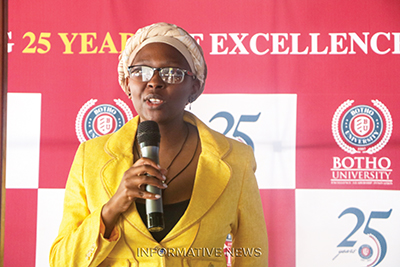By Motšelisi Sekonyela
MASERU
Botho University- Lesotho in association with Rare Diseases Lesotho Association (RDLA), Blood Bank Lesotho, Ntlafatso Foundation and the Ministry of Health held a commemoration for the Rare Disease Day on February 23 at the university’s premises.
The university’s student and alumni department assistant manager Nako Tšenoli said the day is observed worldwide on the last day of February every year, and they decided to observe it in advance.
The purpose of this annual commemoration as stated by the National Organization for Rare Disorders , United State of America is to raise awareness of the over 7,000 rare diseases that impact over 300 million people globally!
Tsenoli says the university felt compelled to hold this event for its students, alumni and staff to educate them on these rare diseases. He said there is need for awareness on these not so common diseases in order for society to know how to live with victims and do away with stigma.
This is where the Ntlafatso Foundation fits in with its already ongoing mandate on running anti stigma campaigns in communities on diseases like HIV/AIDS.
The founder and CEO of RDLA, Nthabeleng Ramoeli who is also a rare diseases patient with a combination of over five rare diseases that she is currently treating said the purpose of her foundation is to educate the public on rare diseases; on some of the symptoms they should look out for, the right steps to take in getting the right diagnosis and treatment as well as how to live with the patients.
Ramoeli said they also help patients meet the right specialists abroad, saying they have had a couple of successful overseas operations that happened under the facilitation of the organisation. Another thing that the organisation does is to support the patients with education and counselling.
She said one of the main challenges they are faced with as rare diseases patients is that in Lesotho, the doctors are general practitioners, so it is a must for them to incur costs to travel overseas or in South Africa to meet with specialists as their conditions cannot be treated by a general practitioner.
The organisation faces the challenge of funding to sufficiently meet all the needs of the over 100 patients that are part of the organisation. In order to send some of them abroad, the organisation has to raise funds internally. They therefore pleaded any and every organisation and individuals who may have the means to assist them in this regard.
The RDLA offices are located at the Maseru District Administration premises.
Ramoeli explained that in order for a disease to be considered rare, it has to be found in 1 in 2000 people, as said by the United Nations. She explained that 80% of these diseases are genetic while 20% of them are as result of factors like infections and complications from underlying diseases. She therefore urged new parents to normalize new born screening so that some of these diseases can be identified early before they get to untreatable stages.
One of the parents of such rare disease patients, ‘Mamotšoane Tšepe is a young, single mother to a seven year old with a rare condition termed “cerebral palsy which is defined as a group of disorders that affect a person’s ability to move and maintain posture.
Tšepe said the diagnosis showed that parts of the child’s brain did not get enough oxygen after birth. She blames this on the nurses that delayed her theatre transfer and thought she was being dramatic when she demanded to be taken to theatre. She urged midwives to be kinder to women in labour and be attentive to their needs as their failure to do that could result in lifelong disabilities like this one.
“My child’s disease is incurable. He is going to live his entire life with it. He is seven years old but acts behaves like a three months baby. He is unable to move nor perform any duties. I still have to buy diapers for him,” said Tšepe.
RDLA founder urged all patients to speak up for themselves in hospitals against incorrect diagnosis by general practitioners and nurses that leads to incorrect treatment as that could be fatal.


